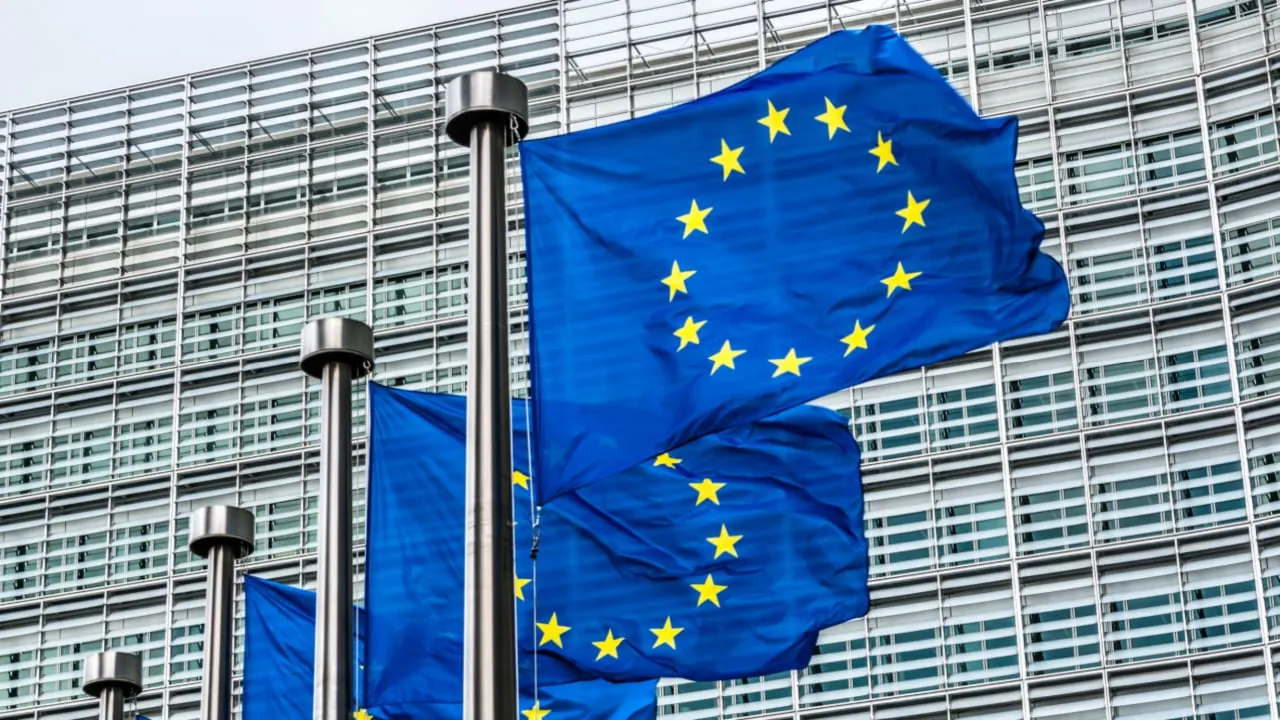AI is moving very fast and we need to move too. The call from the Future of Life Institute @FLIxrisk to pause the development of very powerful AI for half a year, although unnecessarily alarmist, is another signal we need to focus serious political attention on this issue. pic.twitter.com/Tjrj9k02Yj
— Dragoș Tudorache (@IoanDragosT) April 17, 2023
Coin Prices
BTC
$68,103.00
4.36%ETH
$2,049.30
7.62%XRP
$1.44
5.18%BNB
$628.05
4.81%USDC
$0.999902
0.01%SOL
$87.59
6.29%TRX
$0.286308
-0.24%DOGE
$0.099907
7.40%FIGR_HELOC
$1.031
-0.24%WBT
$50.77
4.18%ADA
$0.293916
9.89%BCH
$500.85
1.88%USDS
$0.999925
0.01%LEO
$8.80
1.61%HYPE
$28.21
4.48%CC
$0.174686
8.35%LINK
$9.21
8.47%XMR
$346.80
2.78%USDE
$0.999232
0.02%XLM
$0.163832
7.22%USD1
$0.999805
0.02%RAIN
$0.00951169
1.73%HBAR
$0.102185
5.38%LTC
$56.24
6.69%PYUSD
$0.99998
0.00%ZEC
$246.43
3.89%AVAX
$9.36
8.99%SUI
$0.957278
8.17%SHIB
$0.00000614
3.26%WLFI
$0.11659
1.88%CRO
$0.077997
3.69%TON
$1.28
-0.52%XAUT
$5,153.12
-0.42%DOT
$1.58
24.06%UNI
$4.03
15.23%PAXG
$5,186.11
-0.45%M
$1.36
-4.22%MNT
$0.629416
4.97%BUIDL
$1.00
0.00%USYC
$1.12
-0.00%TAO
$187.23
7.95%USDF
$0.997056
-0.03%ASTER
$0.711649
2.45%AAVE
$114.42
-1.95%PEPE
$0.00000402
2.15%OKB
$78.24
3.98%USDG
$1.00
0.03%SKY
$0.069697
5.49%PI
$0.168673
2.17%RLUSD
$0.999898
0.02%BGB
$2.23
0.32%HTX
$0.00000163
-1.42%NEAR
$1.13
13.76%ETC
$8.99
7.09%ONDO
$0.272262
7.05%BFUSD
$0.999418
0.00%ICP
$2.38
8.89%WLD
$0.409744
4.15%POL
$0.110599
-2.49%USTB
$11.00
0.01%KCS
$8.64
1.71%GT
$7.14
3.80%PUMP
$0.0018336
6.03%NIGHT
$0.060081
4.95%ATOM
$1.92
-5.69%QNT
$64.82
0.82%HASH
$0.0170248
2.04%ENA
$0.1121
10.88%NEXO
$0.857394
3.01%KAS
$0.03160399
7.34%USDTB
$1.001
0.15%PIPPIN
$0.833033
5.80%FLR
$0.00975392
4.33%TRUMP
$3.53
3.55%ALGO
$0.090029
5.60%EUTBL
$1.24
0.12%RENDER
$1.47
6.25%FIL
$1.007
11.16%USDD
$1.00
0.04%OUSG
$114.41
0.01%APT
$0.96245
13.70%JAAA
$1.027
0.00%USDY
$1.12
1.17%XDC
$0.03508557
5.68%VET
$0.00773215
7.62%MORPHO
$1.85
4.78%STABLE
$0.03473286
22.51%BDX
$0.080287
0.06%ARB
$0.100089
7.42%JTRSY
$1.096
0.01%USD0
$0.999154
0.14%BONK
$0.00000634
8.00%JUP
$0.159626
8.02%KITE
$0.300033
12.69%GHO
$1.00
0.02%DCR
$30.10
9.96%A7A5
$0.01284739
-0.98%TUSD
$0.999341
0.03%STX
$0.262393
7.09%SEI
$0.070756
4.11%FTN
$1.087
-0.19%VIRTUAL
$0.711563
3.81%EURC
$1.18
0.04%USDAI
$0.999856
-0.00%PENGU
$0.00720362
8.03%DASH
$35.27
5.88%CAKE
$1.32
6.02%XTZ
$0.395963
6.26%JST
$0.04677241
2.30%KAU
$166.72
0.04%ETHFI
$0.521773
2.46%FDUSD
$1.00
0.03%FET
$0.165356
6.60%CRV
$0.252157
7.30%LIT
$1.49
11.06%CTM
$0.084844
6.02%IP
$1.039
1.68%CHZ
$0.03425675
1.16%AERO
$0.381697
15.72%SIREN
$0.472385
26.26%USX
$0.999742
0.01%GNO
$129.61
4.86%PRIME
$1.02
0.07%POWER
$1.61
124.20%BTT
$0.00000034
2.26%KAIA
$0.056941
4.33%NFT
$0.00000033
0.40%BSV
$16.35
2.19%ZRO
$1.59
6.39%INJ
$3.22
1.37%ADI
$3.21
0.95%SUN
$0.01624242
-1.48%SPX
$0.327939
10.04%PYTH
$0.052985
2.00%TIA
$0.343062
10.53%IOTA
$0.070448
5.33%JASMY
$0.00605461
6.28%GRT
$0.02728642
4.53%CRVUSD
$1.001
0.44%FLOKI
$0.00002997
5.17%SYRUP
$0.236424
6.43%FRAX
$0.984064
-0.61%LDO
$0.321797
5.83%OHM
$17.42
-0.20%2Z
$0.078429
3.76%HNT
$1.42
2.48%CFX
$0.050977
2.90%OP
$0.123742
5.11%BTSE
$1.59
-1.20%TEL
$0.00269253
4.72%H
$0.135616
-0.14%ENS
$6.42
5.25%AB
$0.00245676
-0.99%STRK
$0.04449269
6.95%MON
$0.02228837
10.97%SAND
$0.086507
7.86%NUSD
$1.00
0.16%AXS
$1.34
4.54%UDS
$1.82
7.22%XPL
$0.098923
12.94%YLDS
$0.999997
0.00%USDA
$0.985595
-0.28%AUSD
$0.999387
-0.05%USTBL
$1.075
0.01%PENDLE
$1.29
2.51%WIF
$0.213434
8.54%ZBCN
$0.0021472
2.08%TWT
$0.503209
-1.18%BCAP
$22.79
0.00%APEPE
$0.00000098
2.35%RIVER
$10.17
8.61%FT
$0.09771
-2.18%LUNC
$0.00003635
2.19%ULTIMA
$5,240.53
-1.68%NEO
$2.80
6.29%THETA
$0.196634
7.62%VSN
$0.054115
2.62%BORG
$0.197843
0.89%BARD
$0.858477
11.69%MANA
$0.098472
7.67%PC0000031
$1.00
0.00%TIBBIR
$0.189149
4.14%VVV
$4.21
5.75%FF
$0.079418
1.96%ZK
$0.02006598
-0.26%XCN
$0.00492118
3.35%COMP
$18.59
2.76%GALA
$0.00378817
7.18%FDIT
$1.00
0.00%BAT
$0.116136
-3.02%CVX
$1.88
4.53%IUSD
$1.00
-0.00%FARTCOIN
$0.172407
11.62%REAL
$0.054672
5.71%RAY
$0.625426
3.70%FLUID
$2.13
5.90%SENT
$0.0230469
-4.92%DEXE
$3.55
3.86%MX
$1.80
0.63%9BIT
$0.02003492
-0.80%WFI
$2.03
-0.14%KOGE
$48.00
0.03%SATUSD
$0.995843
0.02%S
$0.04188327
5.43%XEC
$0.0000079
4.07%EURS
$1.26
-0.05%TRAC
$0.335195
6.88%GUSD
$0.998872
-0.06%USDF
$0.998714
0.06%GLM
$0.147421
-2.24%IMX
$0.170906
3.80%RUNE
$0.41313
4.03%THBILL
$1.013
-0.12%WEMIX
$0.302901
0.08%0G
$0.653401
0.79%B
$0.136502
8.99%1INCH
$0.096401
7.14%A
$0.082055
1.49%EGLD
$4.54
3.43%BERA
$0.617884
-1.40%COCO
$0.132392
3.77%SFP
$0.264501
4.04%ACRED
$1,096.64
-0.10%RLB
$0.073528
-3.43%WAL
$0.079487
6.34%JTO
$0.288666
-0.45%MWC
$11.46
-1.70%GOMINING
$0.312219
-2.11%COW
$0.223889
3.02%AMP
$0.00149202
3.49%SNX
$0.362336
-0.74%KTA
$0.251645
1.19%OZO
$0.130667
-0.30%LION
$0.004032
2.32%SKR
$0.02150266
-8.31%EIGEN
$0.204569
5.47%PUSD
$1.001
0.00%GRX
$12.51
9.61%LPT
$2.37
2.80%UB
$0.04662949
13.02%BMX
$0.336946
2.20%BAN
$0.114188
-6.01%QRL
$1.46
2.29%FRXUSD
$0.999764
-0.03%AR
$1.73
-9.03%REUSD
$1.064
0.15%DOLA
$0.99577
0.11%CASH
$0.999826
0.06%
